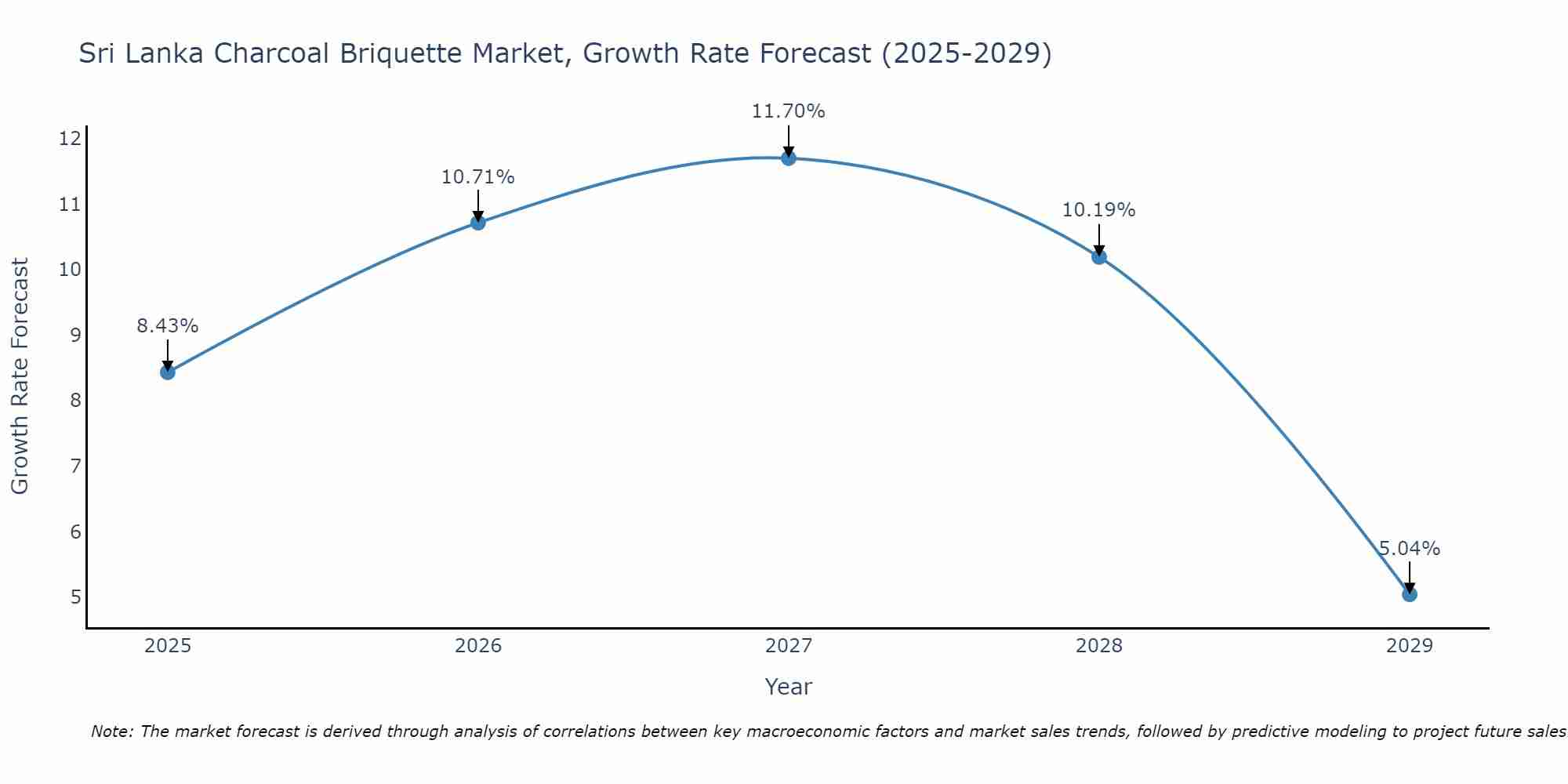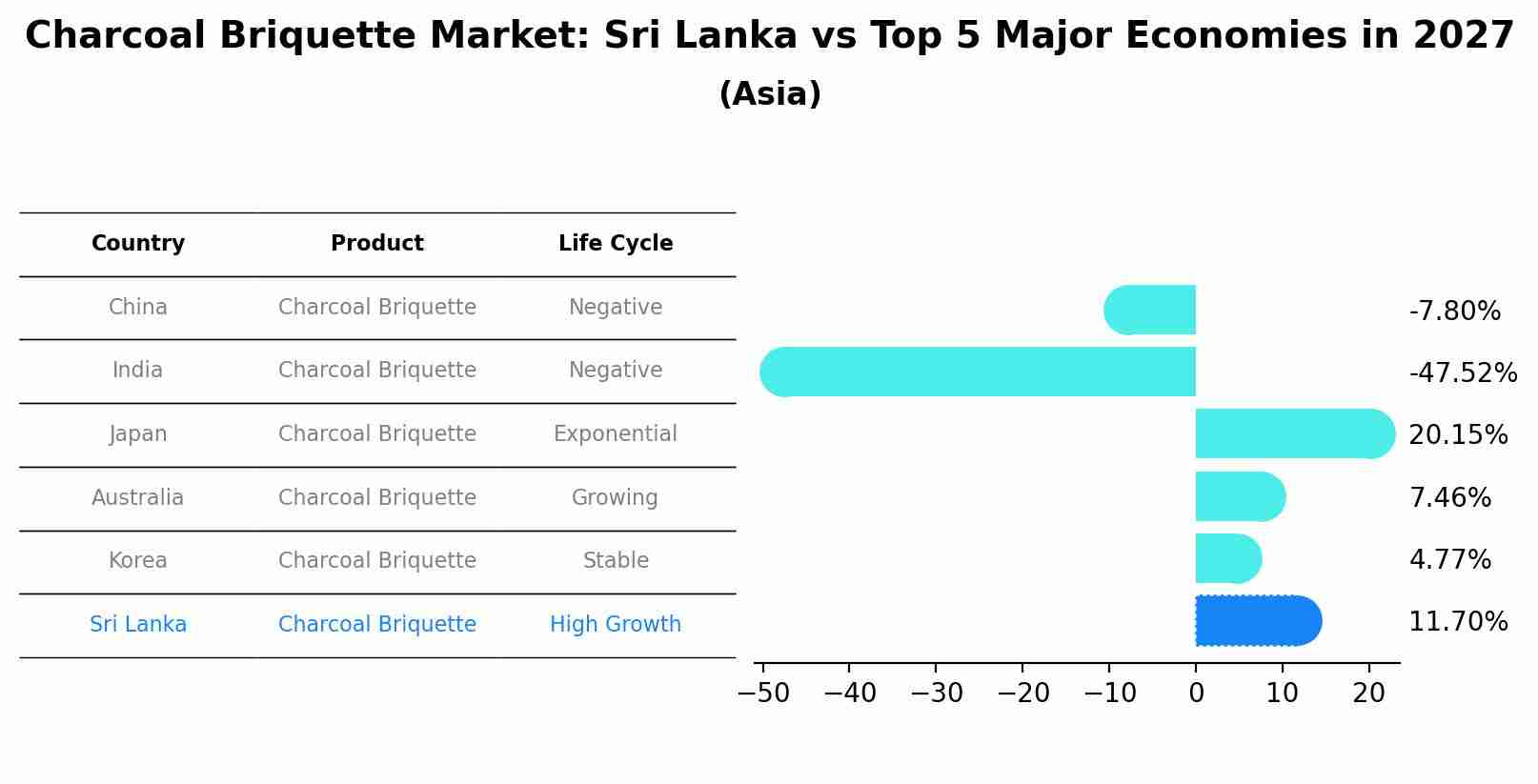Sri Lanka Charcoal Briquette Market (2025-2031) Outlook | Share, Size, Companies, Value, Revenue, Analysis, Forecast, Trends, Growth & Industry
| Product Code: ETC286531 | Publication Date: Aug 2022 | Updated Date: Jul 2025 | Product Type: Market Research Report | |
| Publisher: 6Wresearch | Author: Summon Dutta | No. of Pages: 75 | No. of Figures: 35 | No. of Tables: 20 |
Sri Lanka Charcoal Briquette Market Size Growth Rate
The Sri Lanka Charcoal Briquette Market is projected to witness mixed growth rate patterns during 2025 to 2029. Growth accelerates to 11.70% in 2027, following an initial rate of 8.43%, before easing to 5.04% at the end of the period.

Charcoal Briquette Market: Sri Lanka vs Top 5 Major Economies in 2027 (Asia)
The Charcoal Briquette market in Sri Lanka is projected to grow at a high growth rate of 11.70% by 2027, within the Asia region led by China, along with other countries like India, Japan, Australia and South Korea, collectively shaping a dynamic and evolving market environment driven by innovation and increasing adoption of emerging technologies.

Sri Lanka Charcoal Briquette Market Overview
The Sri Lanka charcoal briquette market has been experiencing steady growth due to increasing awareness about eco-friendly fuel alternatives and rising demand for clean cooking solutions. The market is primarily driven by the growing preference for charcoal briquettes over traditional charcoal due to their lower ash content, higher calorific value, and longer burning time. Key players in the market are focusing on product innovation and marketing strategies to cater to a diverse consumer base, including households, restaurants, and industrial users. Additionally, government initiatives promoting sustainable energy sources and the ban on deforestation for traditional charcoal production are further propelling the growth of the charcoal briquette market in Sri Lanka. The market is expected to continue expanding as more consumers prioritize sustainable and efficient energy sources for their cooking needs.
Sri Lanka Charcoal Briquette Market Trends
The Sri Lanka charcoal briquette market is experiencing a growing demand due to the increasing popularity of eco-friendly and sustainable fuel alternatives. Consumers are increasingly shifting towards charcoal briquettes as they are considered more environmentally friendly compared to traditional charcoal made from wood. Additionally, the convenience and efficiency of charcoal briquettes for cooking and grilling purposes are driving their adoption among households and businesses. The market is witnessing innovations in product offerings, including flavored charcoal briquettes and those with longer burn times. Furthermore, the government`s initiatives to promote the use of charcoal briquettes as a sustainable energy source are also contributing to the market growth. Overall, the Sri Lanka charcoal briquette market is poised for expansion in the coming years.
Sri Lanka Charcoal Briquette Market Challenges
In the Sri Lanka Charcoal Briquette market, some of the key challenges include the availability and consistency of raw materials, such as coconut shells or sawdust, which are essential for producing high-quality briquettes. Additionally, the market faces competition from traditional fuel sources like firewood and LPG, making it challenging for charcoal briquettes to gain widespread acceptance. Distribution and transportation issues also pose a challenge, particularly in reaching rural areas where demand for affordable cooking fuel is high. Moreover, the lack of awareness among consumers about the benefits of charcoal briquettes in terms of cost-effectiveness and environmental sustainability hinders market growth. Overcoming these challenges will require strategic partnerships with suppliers, effective marketing campaigns, and investment in infrastructure to enhance distribution networks across the country.
Sri Lanka Charcoal Briquette Market Investment Opportunities
The Sri Lanka Charcoal Briquette Market presents promising investment opportunities due to the increasing demand for sustainable and eco-friendly cooking fuel alternatives. With the rising awareness of environmental issues and the push towards cleaner energy sources, charcoal briquettes have gained popularity as a cleaner and efficient cooking fuel option. Investors can explore opportunities in manufacturing and distributing charcoal briquettes, as well as investing in technology to improve production processes and product quality. Additionally, there is potential for market expansion through innovative marketing strategies targeting both domestic and export markets. Collaborations with local communities for sourcing raw materials sustainably can also create a positive social impact, enhancing the market appeal. Overall, the Sri Lanka Charcoal Briquette Market offers a promising investment landscape for those looking to capitalize on the growing demand for sustainable energy solutions.
Sri Lanka Charcoal Briquette Market Government Policy
The Sri Lankan government has implemented various policies to regulate the Charcoal Briquette Market. One key policy is the ban on the production and sale of traditional charcoal in order to promote sustainable practices and reduce deforestation. Additionally, the government has provided incentives and support for the production and use of charcoal briquettes as an alternative fuel source. There are also regulations in place to ensure quality control and safety standards in the production process. Overall, these policies aim to promote the use of charcoal briquettes as an environmentally friendly and sustainable energy source while also supporting the growth of the market in Sri Lanka.
Sri Lanka Charcoal Briquette Market Future Outlook
The future outlook for the Sri Lanka Charcoal Briquette Market appears promising, driven by increasing awareness of environmental sustainability and the rising demand for clean and renewable energy sources. With a growing emphasis on reducing deforestation and carbon emissions, charcoal briquettes are gaining popularity as a cleaner alternative to traditional charcoal. Additionally, the convenience and efficiency of charcoal briquettes for cooking and heating purposes are expected to further drive market growth. As the government and various organizations continue to promote sustainable practices and renewable energy solutions, the Sri Lanka Charcoal Briquette Market is likely to witness steady expansion in the coming years, presenting opportunities for both domestic production and export to international markets.
Key Highlights of the Report:
- Sri Lanka Charcoal Briquette Market Outlook
- Market Size of Sri Lanka Charcoal Briquette Market, 2024
- Forecast of Sri Lanka Charcoal Briquette Market, 2031
- Historical Data and Forecast of Sri Lanka Charcoal Briquette Revenues & Volume for the Period 2021 - 2031
- Sri Lanka Charcoal Briquette Market Trend Evolution
- Sri Lanka Charcoal Briquette Market Drivers and Challenges
- Sri Lanka Charcoal Briquette Price Trends
- Sri Lanka Charcoal Briquette Porter's Five Forces
- Sri Lanka Charcoal Briquette Industry Life Cycle
- Historical Data and Forecast of Sri Lanka Charcoal Briquette Market Revenues & Volume By Type for the Period 2021 - 2031
- Historical Data and Forecast of Sri Lanka Charcoal Briquette Market Revenues & Volume By Wood Type for the Period 2021 - 2031
- Historical Data and Forecast of Sri Lanka Charcoal Briquette Market Revenues & Volume By Others for the Period 2021 - 2031
- Historical Data and Forecast of Sri Lanka Charcoal Briquette Market Revenues & Volume By Application for the Period 2021 - 2031
- Historical Data and Forecast of Sri Lanka Charcoal Briquette Market Revenues & Volume By Metallurgical Industry for the Period 2021 - 2031
- Historical Data and Forecast of Sri Lanka Charcoal Briquette Market Revenues & Volume By BBQ for the Period 2021 - 2031
- Historical Data and Forecast of Sri Lanka Charcoal Briquette Market Revenues & Volume By Others for the Period 2021 - 2031
- Sri Lanka Charcoal Briquette Import Export Trade Statistics
- Market Opportunity Assessment By Type
- Market Opportunity Assessment By Application
- Sri Lanka Charcoal Briquette Top Companies Market Share
- Sri Lanka Charcoal Briquette Competitive Benchmarking By Technical and Operational Parameters
- Sri Lanka Charcoal Briquette Company Profiles
- Sri Lanka Charcoal Briquette Key Strategic Recommendations
Frequently Asked Questions About the Market Study (FAQs):
- Single User License$ 1,995
- Department License$ 2,400
- Site License$ 3,120
- Global License$ 3,795
Search
Thought Leadership and Analyst Meet
Our Clients
Related Reports
- Canada Oil and Gas Market (2026-2032) | Share, Segmentation, Value, Industry, Trends, Forecast, Analysis, Size & Revenue, Growth, Competitive Landscape, Outlook, Companies
- Germany Breakfast Food Market (2026-2032) | Industry, Share, Growth, Size, Companies, Value, Analysis, Revenue, Trends, Forecast & Outlook
- Australia Briquette Market (2025-2031) | Growth, Size, Revenue, Forecast, Analysis, Trends, Value, Share, Industry & Companies
- Vietnam System Integrator Market (2025-2031) | Size, Companies, Analysis, Industry, Value, Forecast, Growth, Trends, Revenue & Share
- ASEAN and Thailand Brain Health Supplements Market (2025-2031) | Strategy, Consumer Insights, Analysis, Investment Trends, Opportunities, Growth, Size, Share, Industry, Revenue, Segments, Value, Segmentation, Supply, Forecast, Restraints, Outlook, Competition, Drivers, Trends, Demand, Pricing Analysis, Competitive, Strategic Insights, Companies, Challenges
- ASEAN Bearings Market (2025-2031) | Strategy, Consumer Insights, Analysis, Investment Trends, Opportunities, Growth, Size, Share, Industry, Revenue, Segments, Value, Segmentation, Supply, Forecast, Restraints, Outlook, Competition, Drivers, Trends, Demand, Pricing Analysis, Competitive, Strategic Insights, Companies, Challenges
- Europe Flooring Market (2025-2031) | Outlook, Share, Industry, Trends, Forecast, Companies, Revenue, Size, Analysis, Growth & Value
- Saudi Arabia Manlift Market (2025-2031) | Outlook, Size, Growth, Trends, Companies, Industry, Revenue, Value, Share, Forecast & Analysis
- Uganda Excavator, Crane, and Wheel Loaders Market (2025-2031) | Strategy, Consumer Insights, Analysis, Investment Trends, Opportunities, Growth, Size, Share, Industry, Revenue, Segments, Value, Segmentation, Supply, Forecast, Restraints, Outlook, Competition, Drivers, Trends, Demand, Pricing Analysis, Competitive, Strategic Insights, Companies, Challenges
- Rwanda Excavator, Crane, and Wheel Loaders Market (2025-2031) | Strategy, Consumer Insights, Analysis, Investment Trends, Opportunities, Growth, Size, Share, Industry, Revenue, Segments, Value, Segmentation, Supply, Forecast, Restraints, Outlook, Competition, Drivers, Trends, Demand, Pricing Analysis, Competitive, Strategic Insights, Companies, Challenges
Industry Events and Analyst Meet
Whitepaper
- Middle East & Africa Commercial Security Market Click here to view more.
- Middle East & Africa Fire Safety Systems & Equipment Market Click here to view more.
- GCC Drone Market Click here to view more.
- Middle East Lighting Fixture Market Click here to view more.
- GCC Physical & Perimeter Security Market Click here to view more.
6WResearch In News
- Doha a strategic location for EV manufacturing hub: IPA Qatar
- Demand for luxury TVs surging in the GCC, says Samsung
- Empowering Growth: The Thriving Journey of Bangladesh’s Cable Industry
- Demand for luxury TVs surging in the GCC, says Samsung
- Video call with a traditional healer? Once unthinkable, it’s now common in South Africa
- Intelligent Buildings To Smooth GCC’s Path To Net Zero


















